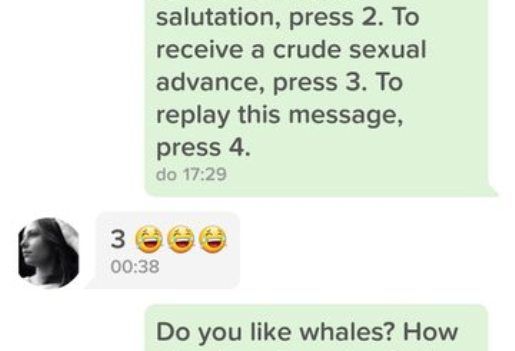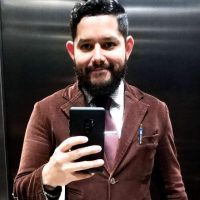I was codependent, and I didn’t know it.
As a recently divorced man forced into solitude, I felt like a stranger to myself. I felt like I was my own enemy and self-saboteur.
Tinder, that infamous platform, entertained me after my divorce.
I had already started my road to self-discovery when I had my first Tinder match. As our Tinder messages progressed, I felt amazed by how much we had in common. Predictably, I was feeling increasingly attracted to her, although I was restraining myself a little. It didn’t feel quite right.
Finally, we agreed to meet for tacos.
It was magical. I felt a strong connection, and I was mesmerized by her. It was so intense that after some time I felt the urge to write a poem about it.
I was feeling like I was 17 again, but I had a feeling it was all destined to collapse.
And, as I suspected, we didn’t meet again—she was only in the city for a short time. So I said, “What the h*ll! I’m not losing anything!” and I sent her my poem.
She replied with this:
“I can see what you are doing. Infatuation is a strong source of energy and you are channeling that energy to create beautiful things.”
I was shocked. It felt like something was ripping my head off. My heart was a turmoil of emotions: fear, regret, pain, anger, shame, and guilt.
After I spent some time licking my wounds, I acknowledged one of the biggest monsters in my life—the one that had haunted me for so many years, the one that was the cause of many failed relationships: codependency.
I was codependent, and, after being divorced, I was desperately seeking someone to attach to through Tinder.
Codependency is about seeking love and acceptance from others, and it goes hand in hand with poor self-esteem.
Through my journey, I have found tools that have helped me recover:
Acknowledge the Source
First things first, we cannot begin to fix something if we are not completely aware of it.
For me, this was the hardest part. I was conscious of my codependent nature, and I was choosing to ignore it. It was easier to leave it on the back burner and not confront it. I needed a series of incidents, like the Tinder incident, to finally acknowledge it and realize the impact it had on my life.
Pause and Plan a Reboot
We need to stop, take a few steps back, and observe our own behavior, kind of like a bad habit detox.
We can then take an inventory of our history, from our most recent relationship to the first one.
>> Are there patterns? Are we assuming a role?
>> Does this have to do with something or someone from our past?
If we don’t have a current relationship, sometimes it can help to take a pause from dating or any romantic activity—deleting Tinder (and any other dating accounts), no texting, no dating, no emailing, and no hookups.
If we are currently in a relationship, we need to find some time for ourselves to reflect and reconnect with ourselves. It is best to do it without making any decisions or demanding something of our partners until we have clarity about our own feelings.
In both cases (with or without a current relationship), we will have to define what our pause and reboot will look like. What I mean by this is that we need to set an objective:
>> I want to be comfortable being alone.
>> I want to feel connected with myself.
>> I want to be fully responsible for my own happiness and well-being.
Own It
We must recognize that “no one is responsible for our own happiness and well-being but ourselves.” [I don’t want to put this quote on a second line and indent… it doesn’t make sense]. As a Codependent, I try to make everyone else responsible for my own happiness.
We have to assume responsibility for our own happiness, our own well-being, our self-love, our actions, our thoughts, our success and also our failures.
Practice Kindness and Non-Judgment
After doing all of this retrospection, we might feel negativity, or maybe we have a lot of difficult feelings or perhaps a few regrets. This thinking is one of those bad habits we need to stop in its tracks.
We must be humble. A lot of people are codependents (ask the guy who is writing this), and we are not that special. We are human, we have failed, and we will fail again (em dash) and that’s all okay.
It’s not worth being harsh and judgmental with ourselves. Better yet, reflect on what we can improve on and start working on it.
Practice Self-Awareness and Connection.
It has always been hard not to judge myself. Over time, I have learned that I’m good at analyzing my feelings and not so good at making plans and strategies. That’s one of the reasons I sometimes feel overwhelmed at work when I have to deal with timing and planning.
But, how can I share myself with another person if I didn’t know this about myself? I can’t ask others to tend to my unknown needs. I must first know what they are and tend to them myself.
So, we must be aware of our own strengths, weaknesses, needs, and expectations. And, in order to do this, we must connect with ourselves.
Try looking at yourself in a mirror, and I am not just talking about the one time you glimpse at yourself during your morning routine. Make intimate eye contact with yourself.
>> Who is this person?
>> What’s in his (her) eyes?
>> What’s in his (her) thoughts and feelings?
>> Do I like this person? Why?
>> Are you aware of all these things?
Practice the mirror routine daily.
Write, write, write, and uncover
Writing might not be for everyone. The idea is to have a tool to analyze our emotions.
When we write a diary, we are forced to think about what we are feeling and write it in a way that we can understand later.
It’s just for us, and since we are practicing kindness and non-judgment, it does not have to be a best-selling novel. It’s a letter to ourselves, and it can be as open and raw as it can get.
Use Meditation and Mindfulness as a way to manage Anxiety
If we are feeling anxious about being alone or having troubles in our relationships, meditation can help.
>> Vipassana meditations are centered on breathing and body scanning.
>> Metta meditations are aimed to practice kindness, non-judgment, and love to ourselves and others.
>> Zazen meditations are about being present and observing our inner self and surroundings.
Mindfulness is about bringing attention to the current moment. It can involve meditation practice, but the goal is to make a lifestyle out of awareness and be present in each and every moment of life.
There are resources online for both meditation and mindfulness as well as many workshops at yoga studios and mental health clinics about how to create a practice.
Take Care of our Bodies
This goes hand in hand with practicing kindness with ourselves.
We can neglect our body in a lot of ways: bad diet, not enough sleep, being sedentary, working too much, too much sugar, too much smoking, and too much drinking. And, like myself, we might be doing a combination of all of these.
All these things can cause bad health—not only physically but also mentally—which can add to a codependent’s low self-esteem.
This could sound trivial, but we often take our health for granted and neglect it. Taking care of our body is one way to love ourselves.
Learn to be alone.
This could be the most important step, but also the most difficult: learning to be alone, learning to be non-attached, and accepting impermanence.
Reflect on the following:
>> How can I expect someone to want to spend time with me if I can’t stand being alone with myself?
>> How can I expect someone to truly love me if I don’t know how to love myself?
>> How can I truly love someone else if I don’t know how to love myself?
Practicing non-attachment does not mean that we don’t love or care for anyone. It means that nothing is permanent, nothing is going to last forever, and that everything has its moment.
We don’t have control over a lot of things in life, so everything can either end or change at any given moment. After my divorce, I started searching to find someone so that I wasn’t alone. Being alone terrified me because I had to confront my reality, feelings, and difficulties. I had to confront myself.
Unfortunately, there were times when no one was able to go to get a coffee or to go to the movies, so I was forced to stay at home, alone–until I realized I was not forced to stay at home. I had a choice.
One of those nights, I decided to go see a movie alone. I was afraid of being seen as a creep but decided that was better than staying home alone. It was actually a joyful night.
It was so gratifying for me that I decided to start dating myself. I started to do a lot of things alone—go to the movies, get a coffee, visit the museum, delight in the theater, explore a nature reserve, and I even went on a trip alone and made new friends.
Find help
It’s good to recognize when we need help. Codependency originates from a collection of experiences in our pasts. It could be our childhood, a past romantic relationship, or something that has hurt us. Learning from it can help us understand ourselves and overcome it.
It takes hard work and courage to overcome codependency and achieve self-sufficiency, but once we begin, we will gradually notice the benefits. It’s worth it.
“To love oneself is the beginning of a lifelong romance.” ~ Oscar Wilde
~












Read 2 comments and reply